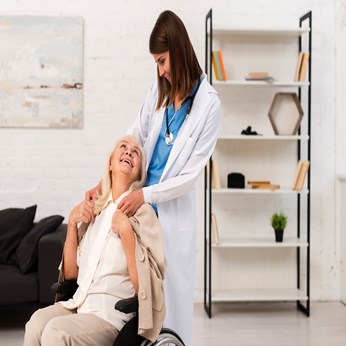Know About Prostate Cancer In Elderly Men
The thought of writing something about eldercare today made me think it was appropriate to write prostate cancer that is very common among Americans and African American men. Early detection helps in successfully treating this type of cancer.
It is significant to note that early stages of prostate cancer does not show any symptoms; the elder would soon have trouble and pain in urinating, frequent urination even at night, burning sensation while urinating, blood in urine or semen and pain in the back, hips, or pelvis, and painful ejaculation.
In the presence of these symptoms the doctor may ask the elder questions about his past medical history and do a rectum examination of the prostrate; hard and lumpy areas could be a sign of cancer. He may also check the prostate-specific antigen level in the elder’s blood; a high level indicates an enlarged prostate or prostate cancer. An ultrasound and a biopsy may also be done to diagnose prostate cancer.

Prostate cancer may be treated by various ways that depends on whether the cancer has affected a part or whole of the prostate or spread to other parts of the body also. Also the treatment will depend on the health and age of the elder and about his own outlook of different types of treatments.
The following are the standard treatments for cancer that has not spread beyond the prostate:
a) An elder and his caretaker could wait and watch if the cancer is growing slowly and not causing problems. The doctor would regularly check for changes in the condition; elders with other medical problems could choose this option.
b) Surgery with removal of the prostate and nearby tissues or radical prostatectomy could be done. The immediate side-effects of it could be loss of sexual function (impotence) or incontinence. If incontinence continues for some time the elder will be required to wear a pad. Another similar surgery is nerve-sparing surgery that gives some men a better chance of keeping their sexual function.
c) The next treatment is radiation therapy that uses high energy x-ray to kill cancer cells and shrink tumors. Radiation could be external radiation therapy where it is beamed on the prostate externally and internal radiation therapy where radioactive "seeds" that are placed in the prostate, into or near the tumor itself. Radiation therapy could cause problems of incontinence and rectal problems like pain, soreness, urgency and trouble controlling bowel movements.
d) Some men are also given hormone therapy after radiation therapy when it is suspected than the cancer will come back or the cancer has spread beyond the prostate. An elder who has undergone hormone therapy may experience side effects like hot flashes, loss of sexual function, and loss of desire for sex.
So do not overlook consulting a doctor if you or an elderly man experiences signs like frequent urge to urinate, painful or burning urination, blood in urine or semen, not able to urinate, painful ejaculation, dribbling of urine and frequent pain and stiffness of the lower back, hips or upper thighs.
Take the next step toward your goals
Share your requirement and find the best care providers in your area
-
Looking for a caretaker’s job? Build your profile and get in touch with families in your vicinity.
-
Discover nannies, babysitters, cooks, housekeepers, pet sitters, and elder care under one roof.
-
Get all the support you need to run a successful care center.
-
Search for appropriate centers near you depending on your needs.
Care Corner Insights: Blog Library

Overnight Babysitters in Bellevue, WA for Business-Travelling NRI Parents: Safety & Policies
For many NRI parents living in Bellevue, WA, frequent business trips are a reality. While traveling, one of the biggest concerns is ensuring your children are safe, cared for, and emotionally supported during overnight stays. Overnight babysitters ca

Indian Home-Style Cooks in Queens, NY: Tiffin-Style Weekly Meal Prep from Your Kitchen
Queens, NY, is home to one of the most diverse food cultures in the country, and Indian cuisine holds a special place among families looking for authentic, comforting meals. While restaurant takeout is convenient, nothing compares to the taste and nu

Baby Sleep Problems: What is Sleep Regression and How to Handle It
If you’re a parent, you know that baby sleep is one of the greatest mysteries of life. One day your little one is snoozing like an angel, and the next day they’re suddenly waking up every hour, fussing, or refusing to nap. Before you panic, there’s a

What is Validation Therapy? A New Approach to Dementia Care
Caring for loved ones with dementia is one of the most emotionally challenging journeys a family can face. Traditional methods often focus on correcting memory lapses or redirecting confused thoughts—but that can sometimes lead to frustration, stress

What is a Part-Time Nanny and Do You Need One
Parenting is a beautiful journey, but let’s be honest—it can also be exhausting! Between work deadlines, household chores, and family responsibilities, sometimes there just aren’t enough hours in a day. That’s where part-time nannies step in, offerin

Part-Time Housekeeper Hiring in Alpharetta, GA: Weekly Schedules, Pricing, and Must-Do Tasks
Keeping a home spotless while balancing work, family, and personal commitments can be overwhelming. For families and professionals in Alpharetta, GA, hiring a part-time housekeeper is one of the most practical solutions. Whether you need help once a

Affordable Daycares in Irving, TX with Indian Menu Options: Parent Reviews & Enrollment Tips
Finding the right daycare for your little one is never an easy decision—especially if you’re looking for one that fits your budget and offers familiar food options like an Indian-inspired menu. For parents in Irving, TX, the good news is that several

Can Babies Sleep on Their Side? Tips for Safe Baby Sleep
When it comes to newborns, every parent worries about the smallest details—how they sleep, what they wear, even which way they turn their tiny heads. One common question that pops up is: “Can babies sleep on their side?” The short answer? Not recom

8 Benefits of Hiring a House Cleaner for Your Home
Let’s be honest — keeping a home sparkling clean while juggling work, family, and daily life can feel like a full-time job in itself. That’s where professional house cleaners step in, turning the chaos into calm. If you’ve been debating whether to br

How to Care for a Gassy Baby? What’s Normal and what’s not – Expert Advice
If you’re a new parent navigating the world of burps, bubbles, and baby fussiness—welcome to the club! Gas in babies is incredibly common, especially in the first few months. But how do you know what’s normal and when it’s time to call in expert help